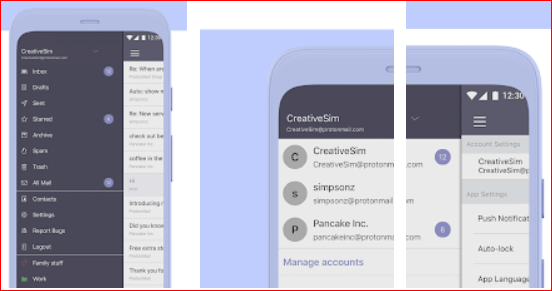
But it wasn’t a direct result of any particular project that they were working on at the time. Yen, who serves as CEO, is the only member of the early founding team who is still active in the leadership of the company.Ī curious facet to the ProtonMail backstory is that the product is often associated with CERN because, well, CERN is where the founders met and developed the product. Several months later, ProtonMail received an additional $2 million cash injection from Charles River Ventures (CRV) and the Fondation Genevoise pour l’Innovation Technologique (FONGIT).įollowing a series of iterative launches, ProtonMail officially shed its beta tag in March 2016, launching to the world with Android and iOS mobile apps in tow. After a minor public furor, the restrictions were lifted and the company went on to crowdfund more than $500,000. Shortly into the campaign, however, PayPal cut off funding after raising questions about whether ProtonMail was legal and had “government approval to encrypt emails,” according to Yen. The following month, the company launched an Indiegogo crowdfunding campaign with the goal of raising $100,000. (Incidentally, it had to close sign-ups soon after due to high demand.) ProtonMail first came to attention in May 2014 with its official public beta launch on the web.

Not even ProtonMail itself.Ībove: Headquarters of Proton Technologies AG in Geneva, Switzerland ProtonMail promises its users full privacy via client-side encryption, which means nobody can intercept and read your emails. The birth of ProtonMailįounded out of Geneva, Switzerland in 2013, ProtonMail was the brainchild of Andy Yen, Jason Stockman, and Wei Sun, academic researchers working on various particle physics projects at CERN - where Tim Berners-Lee created the World Wide Web a quarter of a century earlier. That’s not to say the technology won’t continue to evolve, however.Īgainst this backdrop, one Swiss company has been making inroads into the email realm over the past few years by putting privacy front and center.

People may moan about email and wish it consigned to the fieriest of fires, but all signs suggest it’s here to stay. Microsoft followed suit with a bunch of new features for Outlook.

Elsewhere, Google gave Gmail a major upgrade a few weeks back with a big focus on security and productivity, while at its I/O developers conference this week the company announced a new AI-powered Smart Compose feature for faster emailing.


 0 kommentar(er)
0 kommentar(er)
